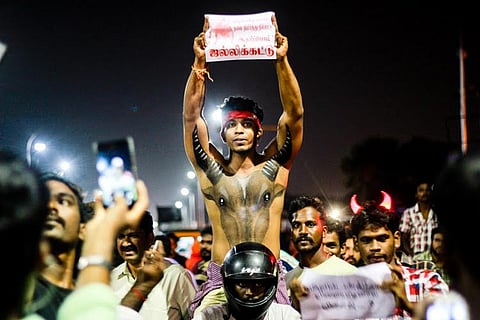

The Madras High Court quashed a single judge’s April order allowing protests on Marina beach in Chennai.
A bench comprising Justice KK Sasidharan and Justice R Subramanian quashed the order passed by Justice T Raja in April that gave permission to P Ayyakannu, the leader of National South Indian River Interlinking Agriculturist Association, to hold a protest at Marina beach. The bench upheld the action taken by the state government to maintain law and order, and said that the beach cannot be used for staging agitations because public order is equally important.
"The right to protest, no doubt is available to all the citizens in a democratic country like ours. Unfortunately, this right to protest has been continuously misunderstood as a right to inconvenience the general public. The protesters who claim to espouse the cause of the public, often forget that their right to protest ends when the other person's right to free movement and "right to not to listen to" starts," read the order.
The court also said that the State always has the power to impose reasonable restrictions with regard to the time, the place and the manner in which the protest should be held and that the authority in whom such power is conferred is expected to balance the right of the protesters as well as the right of the common man.
"Thus, while recognising the fact that dialogue, dissent and deliberation are imperative and necessary in a democracy, other aspects like public order, safety and general public interest must also be given equal weightage and significance, which ultimately make up the true hallmark of a democratic welfare state. The State is therefore correct in regulating the Assembly at Marina in larger public interest," observed Justice KK Sasidharan.
Speaking to TNM, Ayyakannu said that the Supreme Court had earlier ruled that the government's job is to regulate protesters, and that it has no right to impose a ban on protests.
"In a democratic country, protesting is included in the rights granted to us by the Constitution. The government and the police can only regulate us and not ban us. The Supreme Court had given us that right in New Delhi. Based on that, we will appeal in the Supreme Court immediately," he said.
The Tamil Nadu government had filed an appeal challenging the permission granted to Ayyakannu to sit on fast at Marina beach. The fast was planned to highlight the plight of farmers in relation to the formation of the Cauvery Water Management Authority.
Earlier, rejecting the TN government and Chennai police's stand that protests cannot be held at Marina, Justice Raja had said, "Had the then British Government banned Marina Beach from being used for any public meeting, Marina would not have witnessed the presence of Mahatma Gandhi and Thilakar on its sands for the noble cause of Freedom. Therefore, when the then British Government itself did not think of banning the demonstrations at the Marina Beach, this Court is not inclined to accept the submissions made by the respondent."
Additional Advocate General PH Arvindh Pandian represented the Government of Tamil Nadu while Ayyakannu was represented by advocate S Muthukrishnan. Muthukrishnan argued that there is no law that bans protests from being held at Marina, and hence the state must permit Ayyakannu to sit on a fast at the location. The state government said that giving permission would be tantamount to a disruption in the law and order situation in the area and suggested alternate locations for holding the protest.
The arguments in the case concluded in August, and the bench had reserved its verdict without specifying a date.